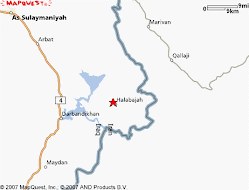Tuesday, March 18, 2008
Remembrance Ceremony Held at Capitol for Halabja’s Victims and Survivors
Washington, D.C. – The Leadership Council for Human Rights (LCHR) and the Kurdistan Regional Government (KRG) hosted a remembrance ceremony today at the United States Capitol in honor of the victims and survivors of Halabja, twenty years after Saddam Hussein launched a deadly chemical attack on the town, killing thousands.LCHR President Kathryn Cameron Porter thanked House of Representatives Speaker Nancy Pelosi, as well as House Foreign Affairs Committee Chairman Howard Berman, Congressional Human Rights Caucus Co-Chair Frank Wolf, and other Members of Congress for their support of Halabja’s victims.Porter opened the ceremony with the words of an anonymous Irish poet: “All the Dead are one – and being One – forgive us.” “We are here today for the living,” Porter said, “and to remember those lives that still have not been atoned for.”KRG U.S. Representative Qubad Talabany called on the United States to remember the twentieth anniversary of Halabja by recognizing what happened there as genocide. “There was genocide in Iraq – in Kurdistan,” Talabany said. He added, “Provisions need to be set aside for the rebuilding of Halabja.”Talabany welcomed special guest Mohammed Aziz, a Halabja survivor now living in Nashville, Tennessee. Talabany called Aziz “a symbol of the strength and resilience of our people.”Aziz gave a chilling firsthand account of the attack, which began on March 16, 1988. He described how planes first flew over Halabja dropping bombs, then went away. When the planes returned, the bombs made a different sound as they fell. He said he and others were “celebrating the different noise, thinking the bombs were duds.” Their celebration quickly turned to dread and panic as they realized these bombs contained poison gas. As a 24-year-old student, Aziz was strong enough to withstand the chemical exposure, but temporarily lost his sight. He said the scene was one of total pandemonium, recalling, “People were dying and shouting. Fathers were burying their children along the roads. Even the animals were suffering, running in circles before they too died.”Twenty years after the devastation of Halabja, LCHR joins the KRG in remembering the victims, and calls on the international community to assist survivors, who are still awaiting justice. While we will never forget the terrible atrocities committed in Halabja, we must focus our energy on improving the quality of life for those still suffering the aftereffects of the attack. Ultimately, we must create a community of consciousness that will safeguard all of humankind against future genocides.
Posted by Joseph K. Grieboski at 5:55 PM
Remembrance Ceremony Held at Capitol for Halabja’s Victims and Survivors
Washington, D.C. – The Leadership Council for Human Rights (LCHR) and the Kurdistan Regional Government (KRG) hosted a remembrance ceremony today at the United States Capitol in honor of the victims and survivors of Halabja, twenty years after Saddam Hussein launched a deadly chemical attack on the town, killing thousands.LCHR President Kathryn Cameron Porter thanked House of Representatives Speaker Nancy Pelosi, as well as House Foreign Affairs Committee Chairman Howard Berman, Congressional Human Rights Caucus Co-Chair Frank Wolf, and other Members of Congress for their support of Halabja’s victims.Porter opened the ceremony with the words of an anonymous Irish poet: “All the Dead are one – and being One – forgive us.” “We are here today for the living,” Porter said, “and to remember those lives that still have not been atoned for.”KRG U.S. Representative Qubad Talabany called on the United States to remember the twentieth anniversary of Halabja by recognizing what happened there as genocide. “There was genocide in Iraq – in Kurdistan,” Talabany said. He added, “Provisions need to be set aside for the rebuilding of Halabja.”Talabany welcomed special guest Mohammed Aziz, a Halabja survivor now living in Nashville, Tennessee. Talabany called Aziz “a symbol of the strength and resilience of our people.”Aziz gave a chilling firsthand account of the attack, which began on March 16, 1988. He described how planes first flew over Halabja dropping bombs, then went away. When the planes returned, the bombs made a different sound as they fell. He said he and others were “celebrating the different noise, thinking the bombs were duds.” Their celebration quickly turned to dread and panic as they realized these bombs contained poison gas. As a 24-year-old student, Aziz was strong enough to withstand the chemical exposure, but temporarily lost his sight. He said the scene was one of total pandemonium, recalling, “People were dying and shouting. Fathers were burying their children along the roads. Even the animals were suffering, running in circles before they too died.”Twenty years after the devastation of Halabja, LCHR joins the KRG in remembering the victims, and calls on the international community to assist survivors, who are still awaiting justice. While we will never forget the terrible atrocities committed in Halabja, we must focus our energy on improving the quality of life for those still suffering the aftereffects of the attack. Ultimately, we must create a community of consciousness that will safeguard all of humankind against future genocides.
Posted by Joseph K. Grieboski at 5:55 PM












